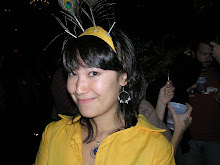I am grateful that so many of his patients allowed me to observe during their visits. I had the opportunity to interview a few patients before the doc entered the room - simple cases of sinus infections or strept throat. I probably should have asked more questions than I did, obtained a more thorough patient history, but I had no clue what I was doing and the patients were very...well...patient.
Most patients main concern, besides their medical problems, involved how they were going to pay for their treatments. In every case, the doctor had to cater his diagnosis and plans according to the patients' insurance, or lack thereof ("Do you want this antibiotic, which is cheap, but might not help you in your case? Or we can run this semi-expensive test, and once we get the results, we can decide which antibiotic to use?"). And on the flip side of the whole encounter was the doc's own medical bills - the high cost and overhead involved in running a private practice. You bill the insurance company for a routine check-up, the insurance company might pay you 50% of what you billed, or they can try to deny the case in the hopes that the office will drop the charges. It's a constant uphill battle for the doc to get reimbursed for treatment. And subsequently, the manner of primary health care has changed significantly, resulting in hustled appointments and rushed diagnosis.
This week has not helped me decide which type of medicine I might go into. The family physician that I stayed with recommended that I choose a specialty that has at least one "procedure" - a high cost but quick fix for the patient, financially rewarding and not time restrictive for the doctor. See, dermatology. Surgery has always interested me, but it's a lifestyle that no one should have to endure, and it is certainly not conducive to having children (something else that I am unsure about). Family medicine is appealing because of the slightly better schedule, and the ability to build lasting relationships with people-patients. And it's all dependent on where one chooses to practice, from the boonies to the big cities. However, changing locations is much easier than changing specialties.
I guess for now, when all my classmates and all my professors and preceptors ask me what type of medicine I want to study, I'll continue to give the vague, uncertain reply, "Not quite sure, I guess I'll figure it out when I start my rotations". I'm sure it won't be an easy decision. But nothing in life really is.
And with that, I have to enjoy my last day before the rest of my life! Er, the last day before medical school starts.
.jpg)

No comments:
Post a Comment